The Rise of “Toxic Masculinity” and the Urgent Lessons of Boys to Men?
In recent years, the term “toxic masculinity” has been at the center of heated debates about gender, culture, and the evolving role of men in society. The concept refers to a rigid, harmful form of masculinity that promotes dominance, emotional suppression, and aggression while discouraging vulnerability and emotional intelligence. From mass shootings to rising rates of depression and suicide among young men, the consequences of this crisis are becoming painfully evident.
Our mini-series Boys to Men? sheds light on the roots of this issue, exploring how adolescent boys struggle to navigate a world caught between outdated notions of manhood and the demands of a more emotionally expressive future. The series has four parts. Each of the three half hour episodes highlights a 15-year-old boy over a one year period. Though each boy is from a different racial and socioeconomic background, they share similar struggles in their search for identity, mentorship, and emotional connection. The fourth part is a 52-minute TV studio discussion with 32 boys, all 15 or 16 years old, sharing insights into their challenges crossing the threshold into mature masculinity.

The Struggle for a Healthy Masculinity
Historically, masculinity was often defined by strength, stoicism, and a reluctance to reveal pain or show emotion. While many aspects of these traits can be positive when balanced, the extreme suppression of emotion and insistence on dominance have contributed to a society where young men feel lost, isolated, and unsupported. Without positive male role models or structured rites of passage into adulthood, boys are typically left to navigate these challenges alone, all too often adopting unhealthy behaviors in the process.
As Boys to Men? poignantly shows, this lack of guidance and initiation into mature masculinity leads to dire consequences. Boys from all walks of life struggle with anger, violence, homophobia, and confusion about relationships with parents, girls and peers. Without structured mentorship, they risk falling into patterns of behavior that reinforce aggression over understanding and control over compassion.

The National Crisis of Boyhood
The New York Times described the situation as “A National Crisis of Boyhood.” The crisis manifests in many ways—declining academic performance, higher rates of suicide, prescriptions of behavior modification drugs at double the rate of girls, and increasing feelings of isolation and despair among young men. The Boys to Men? series addresses these issues with shocking authenticity. The boys’ candid observations about violence, anger, masculinity, and identity points to the emotional turmoil simmering within all teenage boys and highlights the urgent need for change.

A Call for Mentorship and Change
One of the most powerful takeaways from Boys to Men? is the pressing need for mentorship. Young men need adult male figures who model a well-rounded, emotionally mature masculinity—one that embraces strength without suppressing vulnerability. If boys are not properly guided through their transition into manhood, they will turn elsewhere—to media, peers, or worse, to figures who reinforce dangerous stereotypes.
The series offers no easy answers, but it opens the door for necessary, urgent dialogue. The time for passive observation has passed. We must actively engage in reshaping masculinity to support the emotional and social development of young men in healthier, more inclusive ways.

Watch Boys to Men? Today
If you’re concerned about the future of young men and want to understand the roots of today’s masculinity crisis, Boys to Men? is essential viewing. Thought-provoking and deeply moving, it offers an unflinching look at the struggles of teenage boys in America.
Buy or rent the film today at Warrior Films and join the conversation about creating a better future for the generations to come of men and boys. As Frederick Douglass once noted, “It is easier to build strong children than to repair broken men.”

Resources on Masculinity
Toxic masculinity shapes the way boys and men are expected to behave, often reinforcing aggression, emotional suppression, and dominance. But what does it really mean, and how does it impact individuals and society? These resources—films, books, and talks—offer deep insights into the roots of toxic masculinity, its consequences, and ways to redefine masculinity in a healthier, more inclusive way. Whether you’re looking to educate yourself, spark discussions, or challenge outdated norms, this list is a great place to start.
Documentaries & Films
- The Mask You Live In (2015) – Explores how boys are socialized into rigid definitions of masculinity and its effects on society. I was contacted by the producers to be interviewed for this film since they heard I’d worked for years on men and boys and masculinity issues. Later they heard that I was also a filmmaker making films on those issues so they canceled the interview. The film features my friend and former mentee, fiscal sponsee, and men’s group member Ashanti Branch.
- Tough Guise 2 (2013) – By Jackson Katz, analyzing how media and culture shape violent and toxic masculinity. This film is distributed by the Media Education Foundation who have distributed also Boys to Men? for 15 years.
- The Work (2017) – A powerful documentary about a group therapy program for men in Folsom Prison. I actually originated this project back in 2003. I staffed 3 of the first 4 men’s trainings in Folsom from 2000 – 2003, developed the project, got preliminary permission from the warden and state prison supervisor and raised start-up money.
- Miss Representation (2011) – While primarily about women in media, it also touches on masculinity’s restrictive roles. These are the same filmmakers who made The Mask You Live In.
- Hoop Dreams (1994) – While not explicitly about toxic masculinity, it highlights societal pressures on young men, particularly in sports. Working with Arthur and William and their families got me started in thinking about teen boys and maturation which culminated six years later in Boys to Men?
- Adolescence (2025) – This series is a masterpiece. Stay tuned for my blog about it coming soon…
Books
About ⅕ of my entire library of books is comprised of men and boys’ issues so these are just a few…
- My friend Jed Diamond has written about 15 books to date on men’s and boy’s issues.
- Men Explain Things to Me – Rebecca Solnit
- Dude, You’re a Fag: Masculinity and Sexuality in High School – C.J. Pascoe
- For the Love of Men: A Vision for Mindful Masculinity – Liz Plank
- Man Enough: Undefining My Masculinity – Justin Baldoni
YouTube & Online Talks
- Jackson Katz – TED Talk: Violence Against Women—It’s a Men’s Issue
- Justin Baldoni – TED Talk: Why I’m Done Trying to Be “Man Enough”
- BBC Reel – The Rise of Toxic Masculinity
- The Representation Project’s YouTube channel
- My own public talks exclusively about men’s issues have not been filmed. But I have numerous talks on rites of passage and mentorship where I address men and boys issues too: this one in Boulder in 2014, this one at Google in 2015, and this one in Half Moon Bay in 2024.

Warrior Films
At Warrior Films we are dedicated to creating documentaries that inspire personal and social transformation. Best known for our critically acclaimed film Hoop Dreams, we have spent decades amplifying stories that challenge societal norms and advocate for equity. Beyond filmmaking, Warrior Films creates new and supports established social change organizations, collaborates with educational institutions, and provides mentorship and resources for emerging filmmakers.
Notable Achievements:
- Hoop Dreams, voted as the greatest documentary of all time by IDA.
- Extensive outreach programs with schools and universities, e.g. 4200 videos of Higher Goals given to schools nationwide through a program sponsored by Toyota.
- Frederick Marx given Robert F. Kennedy Special Achievement Award.
The Impact of Non-Profit Film Companies
Non-profit film companies play a crucial role in shaping the cultural and social landscape. By prioritizing purpose over dollars, they create powerful narratives that challenge audiences to think critically and act compassionately. These organizations prove that cinema can be both a tool for entertainment and a catalyst for change.
At Warrior Films, we are passionate about creating meaningful stories that leave a lasting impact. If you’re inspired by documentaries like these explore the groundbreaking work of Frederick Marx, one of the acclaimed filmmakers behind “Hoop Dreams,” maker of Journey from Zanskar, Boys to Men?, Veterans Journey Home, and other powerful films.
Visit Warrior Films to:
- Buy or rent our unique, thought-provoking films.
- Purchase our books and immerse yourself in his vision of storytelling as a force for social change and personal growth.
Let’s keep the dialogue alive and keep shaping the world through film and art
In service,



